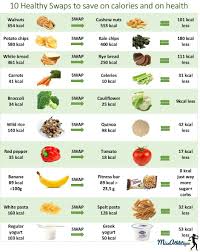The Importance of Healthy Calories for a Balanced Diet
Calories are units of energy that our bodies need to function properly. While many people associate calories with weight gain, it’s important to understand that not all calories are created equal. Consuming the right amount of healthy calories is crucial for maintaining a balanced diet and overall well-being.
Healthy calories come from nutrient-dense foods that provide essential vitamins, minerals, and macronutrients without excessive amounts of added sugars, unhealthy fats, or processed ingredients. These foods include fruits, vegetables, whole grains, lean proteins, and healthy fats.
When we consume the right balance of healthy calories, our bodies receive the necessary fuel to support metabolism, physical activity, and organ function. This can help us maintain a healthy weight, improve energy levels, and reduce the risk of chronic diseases such as diabetes, heart disease, and obesity.
On the other hand, consuming too many unhealthy calories from sugary drinks, fast food, and processed snacks can lead to weight gain and negative health outcomes. These empty calories provide little nutritional value and can contribute to inflammation, insulin resistance, and other health issues.
To ensure you are consuming healthy calories as part of a balanced diet, focus on incorporating a variety of whole foods that are rich in nutrients and low in added sugars and unhealthy fats. Be mindful of portion sizes and listen to your body’s hunger cues to avoid overeating.
By prioritising healthy calories in your daily meals and snacks, you can support your overall health and well-being while enjoying delicious and nourishing foods that fuel your body in the best possible way.
6 Essential Tips for Managing Healthy Calorie Intake
- Choose whole foods like fruits, vegetables, whole grains, and lean proteins for nutrient-dense, lower-calorie options.
- Be mindful of portion sizes to avoid consuming excess calories.
- Stay hydrated with water instead of sugary drinks to help control calorie intake.
- Limit processed and high-fat foods that are often calorie-dense but low in nutrients.
- Include regular physical activity in your routine to help balance calories consumed with calories burned.
- Plan balanced meals and snacks ahead of time to make healthier choices and avoid impulsive high-calorie options.
Choose whole foods like fruits, vegetables, whole grains, and lean proteins for nutrient-dense, lower-calorie options.
When aiming to consume healthy calories, opt for whole foods such as fruits, vegetables, whole grains, and lean proteins. These nutrient-dense choices not only provide essential vitamins and minerals but also offer lower-calorie options that can support a balanced diet. By incorporating a variety of whole foods into your meals, you can ensure that you are nourishing your body with the necessary nutrients while managing your calorie intake effectively.
Be mindful of portion sizes to avoid consuming excess calories.
Being mindful of portion sizes is a key tip for maintaining a healthy calorie intake. By controlling the amount of food we eat, we can avoid consuming excess calories that our bodies may not need. Portion control allows us to enjoy a balanced diet while ensuring we provide our bodies with the right amount of energy without overindulging. Paying attention to portion sizes can help us manage our weight, support our metabolism, and promote overall well-being by keeping our calorie intake in check.
Stay hydrated with water instead of sugary drinks to help control calorie intake.
Staying hydrated with water instead of sugary drinks is a simple yet effective tip for controlling calorie intake and promoting overall health. Water is essential for proper hydration and helps support various bodily functions without adding unnecessary calories. By choosing water as your primary beverage choice, you can avoid the hidden sugars and empty calories often found in sugary drinks, which can contribute to weight gain and other health issues. Making this small but impactful change in your daily routine can not only help you manage your calorie intake more effectively but also improve your overall well-being.
Limit processed and high-fat foods that are often calorie-dense but low in nutrients.
It is important to limit processed and high-fat foods in your diet as they are often calorie-dense but low in essential nutrients. These foods, such as fast food, sugary snacks, and fried items, can contribute to weight gain and have negative effects on overall health. By reducing consumption of these calorie-dense but nutritionally poor options, you can make room for more nutrient-rich whole foods that provide vital vitamins, minerals, and antioxidants to support your well-being. Prioritising whole, unprocessed foods over processed and high-fat choices can help you maintain a balanced diet and ensure that the calories you consume are contributing to your overall health goals.
Include regular physical activity in your routine to help balance calories consumed with calories burned.
Including regular physical activity in your routine is essential for maintaining a healthy balance between the calories consumed and the calories burned. Physical activity not only helps to burn excess calories but also boosts metabolism, improves cardiovascular health, and enhances overall well-being. By incorporating activities such as walking, jogging, cycling, or strength training into your daily schedule, you can support your body in utilising energy efficiently and maintaining a healthy weight. Pairing regular exercise with a diet rich in healthy calories can help you achieve optimal health and vitality.
Plan balanced meals and snacks ahead of time to make healthier choices and avoid impulsive high-calorie options.
Planning balanced meals and snacks ahead of time is a key strategy for incorporating healthy calories into our daily diet. By taking the time to plan, we can ensure that our meals are nutrient-dense and well-balanced, making it easier to make healthier choices throughout the day. This proactive approach helps us avoid impulsive high-calorie options that may not align with our health goals. By having healthy options readily available, we can fuel our bodies with the right nutrients and energy levels needed to thrive and maintain overall well-being.

